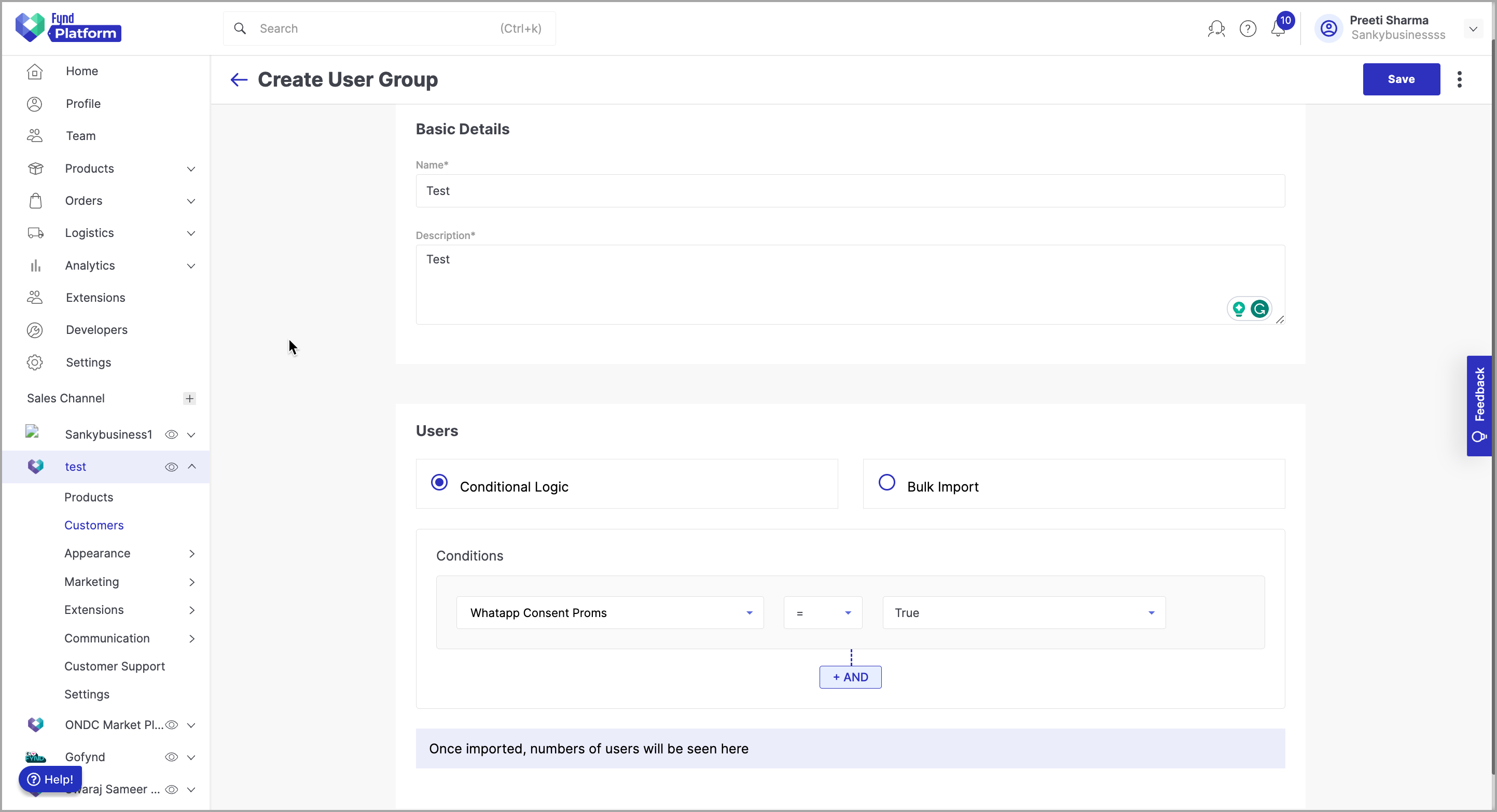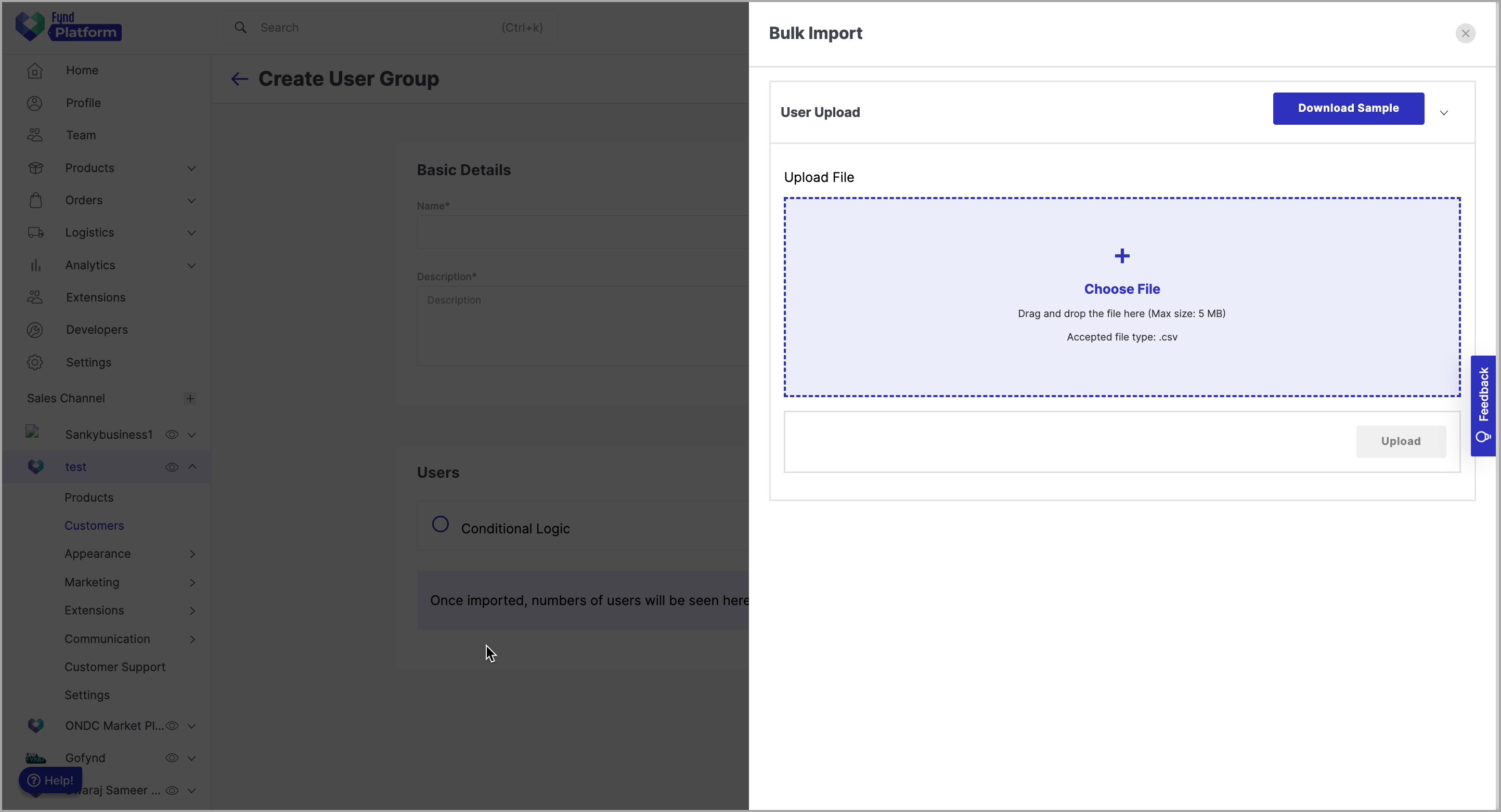Customer Profile & Group
Introduction
This section is for viewing the information of the registered customers and creating user groups. Contact details such as email ID and phone number are available to the staff for any correspondence. Additionally, individual staff can search their customers and view their date of registration, thus leading a pro-active customer service.
Main Screen
![]()
In this document, you will learn more about:
Customer Details
You can view the list of registered customers, as shown in fig. 1. Click on any of them and view their details as shown below.
![]()
The entire customer information is segregated into 8 sections.
Basic
It contains primary information like name, number and email ID.
Rewards
It displays the reward points accumulated by the customer through referral and sign-in. Moreover, it shows a 'Points History' along with an option to block or unblock user in case of any malpractice.
Payment Options
Cash On Delivery (COD)
Turn ON the toggle button to enable cash on delivery (COD) option at checkout for a customer.
Current Available Limit
It is the total COD limit available for each user. Initially, its value is fetched from the field Total COD Limit Per User (Path: Commerce Panel → Sales Channel (select application) → Configuration → Payments → Payment Configuration) of your Fynd Commerce. It varies whenever a user places an order and is calculated as Current Available Limit (post-delivery) = Current Available Limit (pre-delivery) - Total Order Value.
| Orders | Total Order Value | Current Available Limit (pre-delivery) | Current Available Limit (post-delivery) |
|---|---|---|---|
| Initially | - | ₹50,000 | - |
| Order 1 | ₹2,000 | ₹48,000 | ₹50,000 |
Scenario 1
Let us assume that at present Current Available Limit for a particular customer is ₹50,000 then it gets updated depending upon the forward order journey as follows:
- If customer has placed an order of ₹2,000 then Current Available Limit will be ₹48,000 (depleted by ₹2,000 immediately).
- If the order delivery is done then Current Available Limit will be ₹50,000 (replenished by ₹2,000 immediately).
Scenario 2
What will happen with Current Available Limit if you update Total COD Limit Per User when the order is in pre-delivery phase?
- Initially, Current Available Limit was ₹50,000 and a customer has placed an order of ₹2,000.
- You have updated Total COD Limit Per User to ₹70,000 from ₹50,000 in Payments section on Fynd Commerce.
- Now, Current Available Limit will be computed as ₹70,000 - ₹2,000 = ₹68,000 (depleted by ₹2,000 immediately).
- Once the order is delivered, Current Available Limit will be ₹70,000 (replenished by ₹2,000 immediately).
Return order journey does not affect the value of Current Available Limit.
Feedback
(WIP) Ratings and reviews provided by the customer for the product, order processing and delivery.
Timeline
WIP
Devices
(WIP) A list of all the devices through which the customer has logged in.
Notes
WIP
Orders
(WIP) A list of all the past and current orders placed by the customer.
There are other COD-related configuration present in Fynd Commerce. Refer this document: Where to configure Cash On Delivery (COD)?
Creating a New Customer
The Create Customer page allows you to manually add new customers to your list. This helps you to add customer data manually for customers who have been acquired through offline methods such as through events, in-person interactions, or phone orders.
- Click the Create Customer button.
![]()
- Fill in the following customer details:
- Name: Enter customer’s name
- Gender (Optional): Select the gender of the customer from the dropdown menu
- Phone Number: Enter the customer’s phone number. Ensure that the country code is selected correctly
- Email: Enter the customer’s email address
![]()
If the phone number or email you are entering already exists in the system, an error message will appear indicating that the user already exists. You will need to correct the details or check if the customer already exists.
![]()
- You can set the customer’s status to Active or Inactive. This setting is available at the top right of the customer creation page.
![]()
- Once the customer details are filled in, click the Create button to save the customer to your database.
![]()
- After a successful creation, a Customer created successfully message will appear at the top of the customer list, confirming the addition of the new customer.
![]()
Bulk Import and Export of Customer Data
The Bulk Action dropdown allows you to perform actions such as Import and Export for customer data in bulk.
![]()
Importing Customer Data
The Import Customers page allows for bulk uploading of customer data via CSV or Excel file.
- Download the sample file in either CSV or Excel format.
![]()
![]()
- Enter Customer Details in the Downloaded File.
![]()
- You can either drag and drop your file into the File Upload area or click to browse and select a file from your computer. After selecting a file, the file name will appear in the "File selected" field.
![]()
The commerce platform supports .csv, .xls, and .xlsx file formats. The maximum allowed file size is 2 MB.
- While an import is in progress, the status will display as In Process until the operation is completed.
![]()
- The Upload History section lists previously imported files along with their respective statuses. Each import entry is clickable to show more details.
![]()
There are three import statuses — Failed, Partial, and Complete — that merchants will encounter when importing customer data.
- Failed: The Failed status indicates that the import attempt has not been successful.
- Partial: The Partial status means that the import was only partially successful. Some records were imported successfully, while others encountered issues that prevented their processing.
For example, when the import shows a Partial status, you can open the error file to identify the specific reasons for the failure of one or more entries. The error file includes a column labeled ERROR that provides detailed explanations, such as "An account already exists with this phone number: [phone number]" or "An account already exists with this email: [email]." By reviewing the report, you can understand the exact issues—like duplicate entries or incorrect phone numbers—correct them, and re-upload the file.
![]()
Complete: The Complete status indicates that the import was fully successful, with all records being processed correctly without any errors.
You can visit the Customer page to verify your entries.
Exporting Customer Data
The Export Customers page allows you to export customer data in either CSV or Excel format.
- You can choose your preferred export format from the Export dropdown .i.e. either Excel (.xlsx) or CSV (.csv).
![]()
- After initiating an export, you can view the status of respective export under the Export History section. Each export is listed with the respective export status.
When the export is in progress, it will show up with an In Process status. Refresh the page if needed to check the progress.
![]()
Once the export is completed, the status will update to Complete, and the file will be available for download.
You can click on the export file to view the batch details, which includes:
- Exported By: The user who initiated the export.
- Start Time and End Time: The duration it took to complete the export.
- Processing Time: How long the export took to process.
![]()
- Once the export is complete, click the download icon next to the completed export to download the customer data file.
![]()
User Groups
The User Groups button (Refer Figure 1 above) is a feature that lets you create different groups of users based on certain characteristics.
For example:
- Premium Users: You can create a "Premium Users" group for customers who have subscribed to a premium service or made a specific purchase.
- Non-Premium Users: Another group called "Non-Premium Users" can include customers who haven't subscribed to any premium services.
- T-Shirt Economy: If you're running a clothing store, you could create a "T-Shirt Economy" group for customers who often buy t-shirts.
Once you've created these user groups, you can use them to apply special promotions or discounts to specific segments of your customers.
For instance:
- You could offer a 10% discount on all products to the "Premium Users" group as a loyalty reward.
- For the "T-Shirt Economy" group, you might run a "Buy One, Get One Free" promotion on selected t-shirt designs.
By using User Groups and targeted promotions, you can tailor your marketing strategies to different user segments, offering them personalised deals and enhancing their overall shopping experience.
Steps to create user groups
Go to View User Groups.
Click Create.
Enter suitable Group Name (example, Premium Users) and Group Description.
In the User section, you have two options:
- Conditional Logic: Choose conditions to define the user group with specific characteristics. You can set multiple conditions to tailor the characteristics of the user group as needed.

Figure 17: Conditional Logic for User Group - Bulk Import: Upload a CSV file and validate the data in the upload summary.
- Click Download to download sample file.
- Open the downloaded file and fill the user or customer details like phone number or email ID.
- Save the file.
- Click Choose file to select the saved file from your system to proceed for upload.
- Click Upload.

Figure 18: Bulk Upload for User Group - Conditional Logic: Choose conditions to define the user group with specific characteristics. You can set multiple conditions to tailor the characteristics of the user group as needed.
Click Save. Your user group creation is under progress. Please wait until its status changes to COMPLETED.
In this way, your user group will be created successfully.
When editing the user group, only the selected method will be available for modification.
Delete Customer
- From the Customers page of the respective sales channel, find the customer whose data you wish to delete, and go to their profile.
![]()
- In the customer’s profile, click the Erase Personal Data option. This will initiate the process of deleting their PII.
![]()
- A confirmation pop-up will appear, showing what data will be erased. Review the data and proceed.
![]()
- Once you confirm, the system will initiate the data deletion request.
![]()
The data is permanently deleted after a 45-days window, allowing merchants to cancel accidental deletions and check for ongoing transactions, while giving customers a chance to restore their accounts and prevent data loss.
- Merchants can cancel the data deletion process at any time before the data is permanently deleted.
![]()
- Enter the reason for restoring the customer data in the provided text field and click Restore to confirm the action.
![]()
- Merchants can track the status of data deletion requests through the Timeline section in the customer profile.
![]()